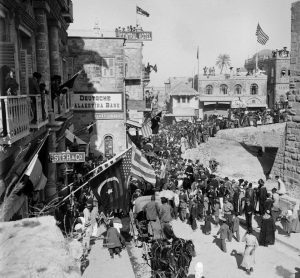I was selected to play football for the Division, and we beat the Cypriots by a comfortable margin. It was all too good to last, and we were replaced, to the Cypriots’ dismay, by the 4th Indian Division.
Once again we embarked for places unknown. To our surprise, after some hours aboard our old friend “Leander”, we arrived in Haifa in Palestine and proceeded to set up camp at Jalama, about ten miles from the city. Again we were a long way from the battle, and we made the most of what we were sure was only a temporary respite from rejoining the fighting men. I was able to go to Nazareth and into Haifa, and once again play football – this time against a team from the Kibutzheim. These embryo Israelis were a much tougher proposition than the French and the Cypriots, and although we won, it was by a narrow margin.
We could see around us the seeds of future troubles. It appeared that the indigenous Arabs were nearly all living in poverty – very often in makeshift shacks outside the cities – whilst the Jews had succeeded in buying up much land and property. The British Army was not popular with the Jewish population and we were insulted and spat upon in the streets of Haifa.

Jerusalem in 1940
There was one dream-like interlude at this time. A convoy of trucks went in to the Lebanon then across Iraq and through Baluchistan to India. I never knew the reason for this convoy but it was certainly an adventure. (And that’s it! Two lines for an episode that most people would make a book out of. I remember my Dad talking about this when I was a kid though I’m nearly as vague as him about what I recall. I do remember him saying that in India, when taking a plate of food from the canteen back to his tent, he would have to carry it in one hand and wave his other hand over it to stop the kites diving down and helping themselves.)
Unfortunately the return journey was all too soon, and we rejoined the Division, which was preparing to move back to Egypt. This time we travelled by rail from Haifa to the Egyptian frontier. Astonishingly there were some customs formalities to undergo, and we were able to exchange our Palestine money for its Egyptian equivalent through the long line of money-changers who sat on mats underneath awnings protecting them from the sun.
We returned briefly to our original camp in the Delta area before being ordered to move ‘up the desert”. After several days’ journey in a great land convoy, we arrived at El Adem, which was a few miles outside Tobruk. So far our contact with the enemy had been spasmodic. The convoy was attacked by Italian fighter planes on two occasions, but they did no damage. There were also some less serious moments. On one occasion the whole convoy was halted whilst a screen was erected about two hundred yards off the desert track, and a portable lavatory was solemnly carried out and placed behind the screen for the Commanding Officer. Two heavily armed sentries stood guard whilst he completed his toilet, and the sight of the “present arms” from the sentries as he came from behind the screen was almost too much, and a ragged cheer went up from the waiting troops. No such luxury was allowed other ranks, although we did take every opportunity to brew tea by simply pouring petrol into a hole and lighting it. This practice was forbidden when both petrol and water became scarce. Life in the desert was uncomfortable and dispiriting. It was very hot during the day and bitterly cold at night. It was also dangerous from the point of view that German raiding parties would make sudden attacks so there was a constant state of alert. We were dug in to a depth of about five feet, with our tents acting as a shade during the day and a cover at night. Water was strictly rationed – a pint per man per day – and when we suddenly had a storm which lasted about half-an-hour we quickly threw off our shorts and boots and stood in the rain for our first bath for months. We were told that it was the only time it had rained in this area for eighteen years. The desert blossomed, and we saw great areas of small flowers and even ears of wheat – left behind by the Romans who had used this part of Libya as a granary. This vegetation disappeared as rapidly as it arrived.
There were almost incessant attacks on Tobruk from Italian and German aircraft. We were just out of range, but we had a grandstand view of the proceedings.
We were soon on our way again, and little did we realise what was going to happen when we set up a new position near Gazala. We had become part of the Gazala box which was meant to impede the German land advance on Tobruk and to stop any attempt by them to get into Egypt. Meanwhile, as there was a quiet period, it was decided to start a “leave” roster. The idea was for two men at a time to go to Alexandria for a week. To my delight, I was drawn first out of the hat, and a Signals linesman and I were given a leave pass for ten days. The irony was that no transport was provided, and we had to make our own way to the railhead at Sollum, which was some two hundred miles west of Tobruk. The only way to accomplish this was to attach oneself to an ammunition or stores convoy going east.
|
|